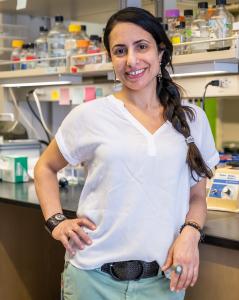Washington Research Foundation awards $245,000 to Shiri Levy to develop de novo protein technology
EBdCas9, designed at the University of Washington, could enable the stimulation of genes that combat diseases
As a WRF Innovation Postdoctoral Fellow in the UW lab of Hannele Ruohola-Baker, Ph.D., Levy and her colleagues created EBdCas9, a patented protein complex that can precisely control gene expression without making permanent changes to the genome. With a $50,000 grant from WRF in 2019, Levy and Ruohola-Baker further refined the EBdCas9 technology to demonstrate its potential to upregulate genes of interest that are normally epigenetically suppressed by a complex known as PRC2.
“Shiri has developed a truly novel and exciting technology that can very precisely control gene expression with EBdCas9, crucially, without making any permanent changes to the genome,” said Meher Antia, Ph.D., director of WRF’s grant programs. “We believe that our funding will help her to demonstrate a key application of this technology. WRF is delighted to have supported such a talented and creative scientist through various stages of her career.”
“Our progress is largely because of WRF’s support,” said Levy. “They provided funding and mentorship throughout my postdoc and through the application and funding of both technology development grants. On a side note, I gave birth during this time. Women in science still have a lot of growing pains with managing their careers and parenthood, and the flexibility that WRF gave me is not common. It’s an excellent example of how this type of support can help.”
Over the next year, this latest funding from WRF will enable Levy to get to a point where she can demonstrate utility of the EBdCas9 technology in disease models. This will be an important step toward validating that the technology can be used in the context of therapeutics. In the future, the technology could be expanded to other applications that might benefit from a similarly targeted approach to controlling gene expression.
About Washington Research Foundation:
Washington Research Foundation (WRF) supports research and scholarship in Washington state, with a focus on life sciences and enabling technologies.
WRF was founded in 1981 to assist universities and other nonprofit research institutions in Washington with the commercialization and licensing of their technologies. WRF is one of the foremost technology transfer and grant-making organizations in the nation, having earned more than $445 million in licensing revenue for the University of Washington and providing over $127 million in grants to the state's research institutions to date.
WRF Capital, a reserve pool of funds for investing in early-stage Washington state companies, has backed 114 local startups since 1994. Returns from these investments support the Foundation’s mission.
For additional information, please visit https://www.wrfseattle.org/.
Meher Antia, Ph.D.
Director, Grant Programs
+1 206-336-5600
email us here
Visit us on social media:
Twitter
LinkedIn
Legal Disclaimer:
EIN Presswire provides this news content "as is" without warranty of any kind. We do not accept any responsibility or liability for the accuracy, content, images, videos, licenses, completeness, legality, or reliability of the information contained in this article. If you have any complaints or copyright issues related to this article, kindly contact the author above.


